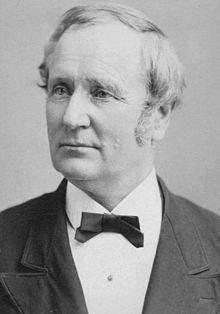Thomas A. Hendricks
| Thomas A. Hendricks | |
|---|---|

Thomas Andrews Hendricks, c. 1860–1865
|
|
| 21st Vice President of the United States | |
|
In office March 4, 1885 – November 25, 1885 |
|
| President | Grover Cleveland |
| Preceded by | Chester A. Arthur |
| Succeeded by | Levi P. Morton |
| 16th Governor of Indiana | |
|
In office January 13, 1873 – January 8, 1877 |
|
| Lieutenant | Leonidas Sexton |
| Preceded by | Conrad Baker |
| Succeeded by | James D. Williams |
|
United States Senator from Indiana |
|
|
In office March 4, 1863 – March 4, 1869 |
|
| Preceded by | David Turpie |
| Succeeded by | Daniel D. Pratt |
| Member of the U.S. House of Representatives from Indiana's 6th district |
|
|
In office March 4, 1853 – March 4, 1855 |
|
| Preceded by | Willis A. Gorman |
| Succeeded by | Lucien Barbour |
| Member of the U.S. House of Representatives from Indiana's 5th district |
|
|
In office March 4, 1851 – March 4, 1853 |
|
| Preceded by | William J. Brown |
| Succeeded by | Samuel W. Parker |
| Member of the Indiana General Assembly | |
|
In office 1848–1850 |
|
| Personal details | |
| Born |
Thomas Andrews Hendricks September 7, 1819 Fultonham, Ohio |
| Died | November 25, 1885 (aged 66) Indianapolis, Indiana |
| Nationality | American |
| Political party | Democratic |
| Spouse(s) | Eliza Morgan Hendricks |
| Children | Morgan Hendricks (1848–51) |
| Alma mater | Hanover College |
| Religion | Episcopalian |
| Signature | |
Thomas Andrews Hendricks (September 7, 1819 – November 25, 1885) was an American politician and lawyer from Indiana who served as the 16th Governor of Indiana (1873–77) and the 21st Vice President of the United States (1885). Hendricks represented Indiana in the U.S. House of Representatives (1851–55) and the U.S. Senate (1863–69). He also represented Shelby County, Indiana, in the Indiana General Assembly (1848–50) and as a delegate to the 1851 Indiana constitutional convention. In addition, Hendricks commissioner of the General Land Office (1855–59). Hendricks, a popular member of the Democratic Party, was a fiscal conservative known for his honesty and adherence to the U.S. Constitution. He defended the Democratic position in the U.S. Senate during the American Civil War and Reconstruction Era and voted against the Thirteenth, Fourteenth, and Fifteenth Amendments to the U.S. Constitution. He also opposed Radical Reconstruction and President Andrew Johnson's removal from office following Johnson's impeachment in the U.S. House.
...
Wikipedia
